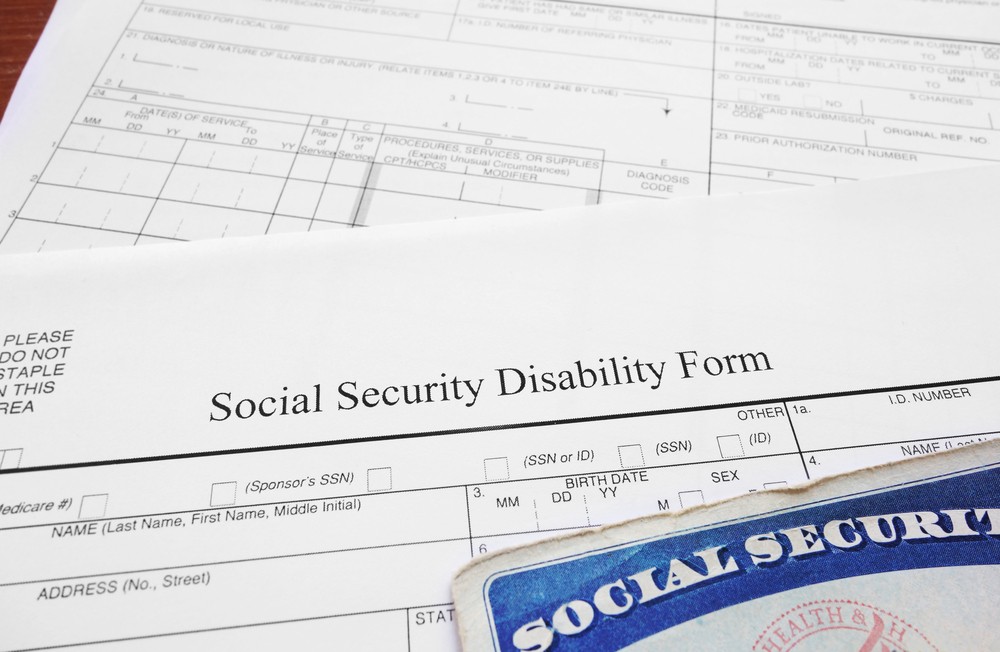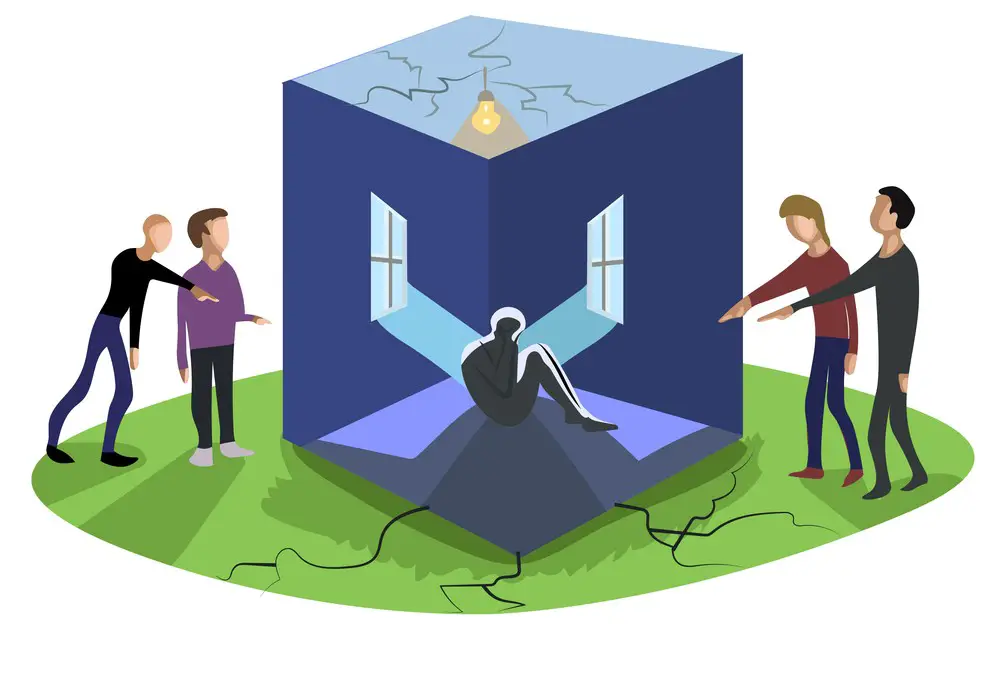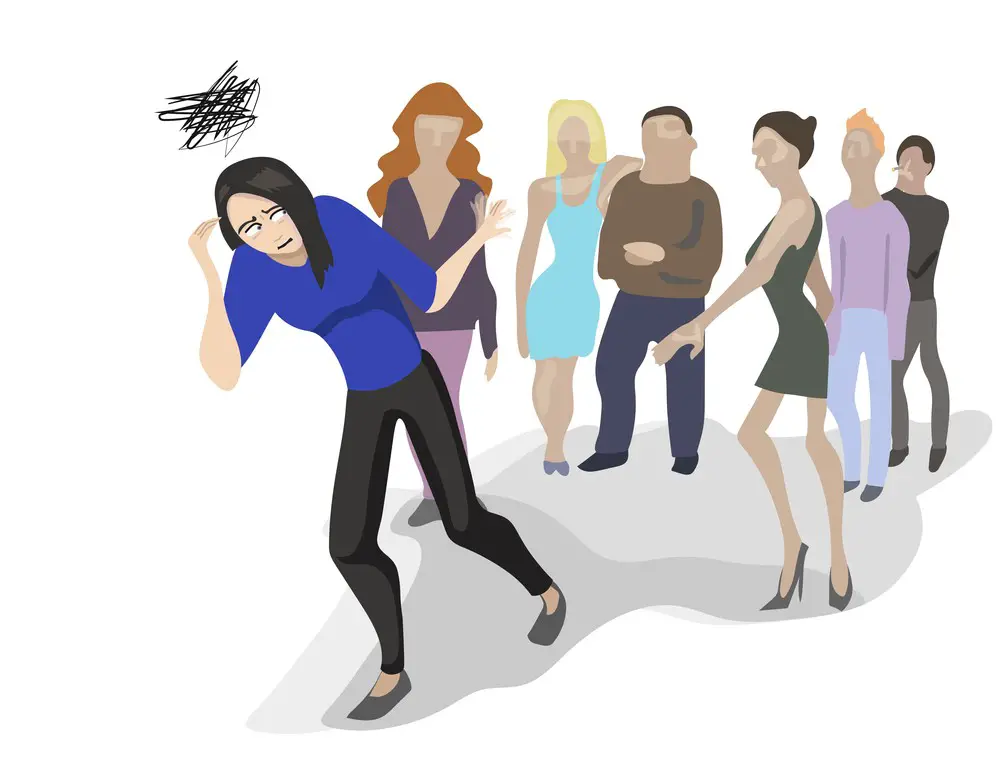Social anxiety, a condition in which individuals experience excessive fear and discomfort in social situations, can significantly impact one’s quality of life. For some, this anxiety becomes so overwhelming that it hampers their ability to maintain a job, attend school, or engage in healthy relationships. The question then arises – can social anxiety be considered a disability?
The term “disability” is often associated with physical limitations, but it can also encompass mental health disorders that hinder a person’s ability to perform daily tasks and maintain gainful employment. Regarding social anxiety, the severity and impact on a person’s life determine whether it meets the criteria for a disability. In this article, we will explore the factors that contribute to social anxiety being classified as a disability, as well as the available support and resources for individuals with debilitating social anxiety.
Key Takeaways
- Social anxiety can be considered a disability depending on its severity and impact on daily life
- Diagnosis of social anxiety as a disability requires meeting specific criteria
- Access to treatment and support options is crucial for individuals with debilitating social anxiety
 Understanding Social Anxiety
Understanding Social Anxiety
Social anxiety, also known as social anxiety disorder or social phobia, is a mental health condition characterized by excessive fear, worry, and discomfort in social situations. It goes beyond the occasional feeling of nervousness and can significantly impact an individual’s ability to interact with others and engage in everyday social activities.
The symptoms of social anxiety can manifest both physically and emotionally. Common physical symptoms include sweating, shaking, and a rapid heartbeat, while emotional symptoms may encompass feelings of inadequacy, restlessness, and irritability. People with social anxiety often have difficulty concentrating, suffer from fatigue, and struggle with a constant sense of impending doom in social settings.
Individuals experiencing social anxiety typically exhibit avoidance behaviors, steering clear of social interactions as much as possible. This can lead to impaired social functioning—sometimes even to isolation. Their excessive anxiety is often disproportionate to the situation, and they may significantly overestimate the likelihood of being judged, embarrassed, or rejected by their peers.
It’s important to note that social anxiety differs from introversion or shyness. While some introverted individuals may prefer solitude or small group interactions, they don’t necessarily experience the same crippling fear or anxiety that characterizes social anxiety disorder.
If you think you or someone you know may be experiencing social anxiety, it’s essential to consult a qualified mental health professional, such as a psychologist or therapist. These experts can provide clinical assessments, recommend evidence-based treatments, and help individuals learn coping strategies to manage their symptoms and improve their overall well-being. Effective interventions can include cognitive behavioral therapy, medication, and support groups to reduce anxiety levels and enhance social functioning.
Key takeaway: Social anxiety is a mental health disorder that involves excessive fear, worry, and discomfort in social situations, leading to avoidance behaviors and impaired social functioning. Consult a mental health professional for diagnosis and appropriate treatment options.
 Defining Disability
Defining Disability
When discussing social anxiety as a disability, it’s crucial first to understand the concept of disability itself. A disability is generally defined as a medical condition or impairment significantly limiting an individual’s ability to perform daily activities, engage in meaningful relationships, and maintain gainful employment. Disabilities may be physical, cognitive, or psychological, and can sometimes be a combination of these factors.
Social anxiety is a persistent and overwhelming fear of social situations or interactions, resulting in severe emotional distress and functional limitations for those affected. It’s essential to recognize that social anxiety is more than just shyness or occasional nervousness; it’s a debilitating mental health condition that can significantly impact an individual’s quality of life.
In order to be considered a disability, social anxiety must be a medically determinable impairment that affects an individual’s daily life. This means that a qualified medical professional must diagnose the condition, and it must significantly interfere with the individual’s ability to function in various aspects of their daily routine. Some common functional limitations that may arise from social anxiety include:
- Difficulty speaking with others, making eye contact, and maintaining conversations
- Intense fear of interacting with strangers or being judged in social situations
- Struggling to make friends, engage in social events, or participate in activities that involve groups of people
- Experiencing physical symptoms, such as rapid heartbeat, sweating, and trembling when faced with social situations
The United States Social Security Administration (SSA) has specific criteria that need to be met for an individual with social anxiety to qualify for disability benefits. These criteria include extreme limitations in at least one area or marked limitations in two areas of mental functioning, such as understanding, remembering, or applying information.
In summary, social anxiety can be considered a disability if it has been medically diagnosed, significantly interferes with an individual’s daily life, and meets the necessary criteria for functional limitations established by the SSA.
 Comparing Social Anxiety and Disability
Comparing Social Anxiety and Disability
Social anxiety disorder, also known as social phobia, is a type of anxiety disorder characterized by intense fear and discomfort in social situations. Those with social anxiety often experience difficulty talking and making eye contact, fear of interacting with strangers, and concerns about being judged or embarrassed. This mental health condition can severely impact a person’s ability to function daily and may lead to impairment like work, relationships, and overall well-being.
On the other hand, a disability is a condition that results in significant limitations in one or more aspects of a person’s life, such as work or social interactions. Disabilities can be physical or mental, and in the context of Social Security disability insurance (SSDI), a disability must meet specific criteria for a person to qualify for benefits. According to the Social Security Administration (SSA), a disability is characterized by the following criteria:
- You cannot do work that you did before because of your medical condition
- You cannot adjust to other work because of your medical condition
- Your disability has lasted or is expected to last for at least one year or result in death
Comparing social anxiety disorder to a disability, we observe that anxiety can be considered a disability if the condition is severe enough to meet the criteria above. The SSA considers several factors when determining whether a person’s anxiety disorder qualifies for disability benefits, such as the extent to which the person’s daily functioning is impaired, the symptoms presented, and any limitations they may face in their work and social lives.
To improve one’s chances of qualifying for SSDI due to anxiety, it is essential to provide documentation demonstrating the severity of the condition and its limitations on daily functioning. Some common physical symptoms of anxiety disorders include muscle tension, rapid heartbeat, and shortness of breath. Mental health professionals can also help diagnose and provide evidence of the severity of one’s social anxiety disorder.
In summary, while not all cases of social anxiety disorder qualify as a disability, those experiencing severe limitations in their daily lives and work performance may be eligible for disability benefits under SSDI. Understanding the criteria set by the SSA and providing robust documentation of one’s social anxiety disorder can help increase the likelihood of obtaining the necessary support and assistance.
Diagnosis of Social Anxiety as a Disability
When considering social anxiety as a disability, it’s crucial to understand the diagnostic process. To be professionally diagnosed, an individual should consult a psychologist or psychiatrist experienced in evaluating and diagnosing anxiety disorders. These medical professionals typically use a combination of interviews, psychiatric evaluations, and standardized assessment tools to determine the severity of social anxiety.
One essential consideration is obtaining medical documentation from their psychologist or psychiatrist that explicitly outlines the nature and severity of the social anxiety disorder. These documents should include medical records and specific mental status examinations, which can be instrumental in determining whether the individual qualifies for disability benefits.
It’s vital for individuals to maintain an organized and comprehensive collection of their medical records and evidence, as this documentation will be the key to supporting their claim for social anxiety as a disability. Keep copies of all relevant documents, including:
- Medical records from psychologists and psychiatrists
- Notes from therapy sessions
- Medication prescriptions and records
- Results from any mental status examinations and diagnostic assessments
- Statements from individuals who can attest to the severity of the social anxiety, such as family members, friends, or co-workers
To be considered a disability, social anxiety symptoms must interfere significantly with daily living, including the ability to work and maintain social relationships. Thus, the medical evidence and documentation provided should demonstrate the impact of social anxiety on various aspects of an individual’s life.
In summary, diagnosing social anxiety as a disability involves a thorough evaluation by psychologists or psychiatrists, comprehensive medical documentation, and evidence of the disorder’s impact on daily living. With these elements in place, individuals struggling with social anxiety can seek the appropriate support and accommodations, such as applying for disability benefits or workplace adjustments.

Treatment and Support Options
Regarding social anxiety, several treatment and support options are available to help individuals manage their symptoms and improve their overall quality of life.
Therapy: One of the primary treatments for social anxiety is psychotherapy, which focuses on helping individuals better understand and cope with their anxiety. Cognitive-behavioral therapy (CBT) is one of the most effective therapies for social anxiety disorder, as it helps patients identify and challenge negative thought patterns while developing new coping mechanisms for stressful situations.
Medication: Sometimes, medication may be prescribed to help manage social anxiety symptoms. Selective serotonin reuptake inhibitors (SSRIs) and benzodiazepines are some examples of medications that can help control feelings of anxiety while working on long-term coping strategies.
Support Groups: Participating in support groups can be incredibly beneficial for individuals with social anxiety. These groups provide a safe environment for people to share their experiences, learn from others, and receive encouragement as they work towards overcoming their mental health challenges.
Alternative Treatments: For those seeking additional support, alternative treatments such as deep breathing exercises, relaxation techniques, and mindfulness meditation can all be helpful. These practices can aid in managing stress and anxiety levels by promoting relaxation and enhancing overall mental health.
Lifestyle Changes: Adopting a healthier lifestyle by improving diet, getting regular exercise, and ensuring adequate sleep can also contribute to better management of social anxiety symptoms. By maintaining a healthy balance in daily life, individuals can experience reduced stress and anxiety levels.
To provide the most effective treatment for social anxiety, individuals need to work closely with a mental health professional to develop a personalized treatment plan. This may involve a combination of therapies, medications, and support strategies tailored to the individual’s unique needs and goals. Individuals with social anxiety can work towards a happier, more fulfilling life by taking advantage of the various treatment and support options available.

Applying for Disability Benefits
Applying for disability benefits due to social anxiety can be complex, but you can increase your chances of approval with the proper guidance and information. To qualify for Social Security Disability Insurance (SSDI) or Social Security Disability Benefits (SSDB), you must meet specific criteria, provide convincing evidence, and follow the necessary steps in the application process.
First, ensure that your social anxiety meets the Social Security Administration (SSA) guidelines for disability claims. Your condition should be severe enough to prevent you from performing regular work tasks. To prove this, gather documentation about your medical treatment and any therapies you’ve undergone to manage your condition. Consistent medical records are crucial for showing that social anxiety significantly affects your ability to work.
Next, evaluate your work history. The SSA may assess your ability to take on other work tasks or adapt to different environments based on your past employment. If you demonstrate that your social anxiety has hindered your professional development or made it impossible to maintain a job, this strengthens your case for disability benefits.
When beginning your application for disability benefits, be as thorough as possible. Complete every section and provide detailed information about how social anxiety interferes with daily life and work tasks. Inaccurate or incomplete forms may result in delays or denials.
While applying, don’t forget to consider your financial eligibility for disability benefits. Social Security Disability Insurance (SSDI) is based on your work history, while Social Security Disability Benefits (SSDB) are awarded to those with limited income and resources. Review the requirements for your chosen benefit program and submit any necessary documentation.
Remember, patience is key when applying for disability benefits. The process can be lengthy and require multiple appeals if your initial application is denied. However, with persistence, clear evidence, and a strong case, you can successfully secure disability benefits for social anxiety.
Legal Assistance for Disability Claim
Hiring a disability lawyer can immensely benefit individuals suffering from social anxiety and seeking disability benefits. These experienced professionals are well-versed in the specific requirements and processes of filing a claim with the Social Security Administration (SSA).
A disability lawyer can help you gather the necessary medical documentation to prove that your anxiety significantly affects your daily life. They can work closely with you to ensure your case meets the SSA’s criteria for disability, thereby increasing your chances of getting your claim approved.
If your disability claim has been denied, don’t worry; a disability lawyer can also assist in the appeals process. They will analyze your case to identify any factors contributing to the denial and work with you to strengthen your case for resubmission.
Most disability lawyers work on a contingency basis, meaning they only receive payment if your claim is successful. This can be particularly advantageous, as it eliminates the stress of upfront legal expenses and ensures your lawyer is highly motivated to champion your case.
In the event your claim is approved, your disability lawyer may also help in securing back pay. This retroactive compensation covers your initial filing and the date the SSA approves your disability benefits.
In summary, working with a disability lawyer can provide valuable guidance and support for individuals suffering from social anxiety navigating the complex world of disability claims. Their expertise and knowledge can be invaluable in helping you secure the benefits you rightfully deserve.

Crossing the Line: Clear Signs Your Social Anxiety Needs Therapy—Disability or Not
Social anxiety can manifest subtly, but certain red flags shouldn’t be ignored. These indicators suggest that therapy could be particularly helpful, especially if your symptoms escalate to a level that could be considered a disability:
- Avoidance of Social Situations: You consistently avoid social events or public places, causing you to miss out on life’s experiences.
- Physical Symptoms: Experiencing nausea, excessive sweating, or heart palpitations when discussing or engaging in social interactions.
- Impact on Relationships: Your social anxiety makes it difficult to form or maintain relationships, both personal and professional.
- Performance Anxiety: An overwhelming fear of being watched or judged, affecting your work or school life.

Your Therapy Goals: Setting a Course for Change
Therapy can offer the tools to manage your social anxiety effectively, disability or not. When starting therapy, consider the following goals:
- Behavioral Exposure: Gradually expose yourself to social situations to lessen anxiety over time.
- Social Skills Training: Enhance your communication and interaction skills for more rewarding social experiences.
- Anxiety Management: Learn techniques to manage physical symptoms and anxious thoughts.
- Cognitive Reframing: Challenge and change the negative thought patterns that fuel your social anxiety.
Progress Checkpoints: Signs You’re on the Right Track
Therapy isn’t a quick fix; it’s a process. But some milestones can help you and your therapist gauge your progress:
- Increased Comfort: You find it easier to engage in social situations that used to terrify you.
- Improved Relationships: You’re starting to form and maintain healthier relationships.
- Better Coping Strategies: You’re using the tools learned in therapy to manage anxiety in real time.
- Positive Self-Image: You notice a decline in self-critical thoughts and an improvement in how you view yourself.
Even if social anxiety doesn’t meet the formal criteria for a disability in your case, it can still have a substantial impact on your life. Recognizing when it’s time to seek professional help, setting actionable therapy goals, and tracking your progress can be crucial steps toward reclaiming your life from social anxiety.
Frequently Asked Questions

Can social anxiety qualify as a disability?
Yes, social anxiety can qualify as a disability under certain circumstances. To be considered a disability, social anxiety must significantly impair daily functioning and meet the eligibility criteria established by organizations like the Social Security Administration (SSA).
What makes anxiety a disability?
Anxiety becomes a disability when it has a severe negative impact on daily life and meets specific criteria set forth by disability programs. These criteria could include an inability to maintain employment, difficulty in social situations, and having a medically determinable impairment that affects the individual’s ability to function.
How to receive a diagnosis for social anxiety?
To receive a diagnosis for social anxiety, it is recommended to consult with a licensed mental health professional, such as a psychologist or psychiatrist. They will assess the severity and duration of symptoms and will determine if social anxiety disorder is present, using established diagnostic criteria such as those outlined in the Diagnostic and Statistical Manual of Mental Disorders (DSM).
Is social anxiety related to mental illness?
Yes, social anxiety is a type of mental illness. It is categorized as an anxiety disorder characterized by an intense fear of social situations, avoidance of social interactions, and excessive self-consciousness in daily activities.
Are genetics involved in social anxiety?
Research suggests that genetics may play a role in the development of social anxiety. While the exact causes of social anxiety disorder are still not fully understood, it is believed that a combination of genetic, environmental, and psychological factors contribute to its development.
Is there a connection between social anxiety and autism?
Some evidence suggests that individuals with autism spectrum disorder (ASD) might be more prone to developing social anxiety. Although these conditions are different, they can share overlapping features, such as difficulty with social interactions, communication, and forming relationships. It’s important to remember that having one condition does not necessarily mean you will have the other; each individual’s experience will be unique.
Jacob Maslow
After surviving the traumatizing events of 9/11, I took it upon myself to heal through helping others. I’m the primary caregiver of my children and understand from first-hand experience the lonely paths you have to walk as a partner and parent when leaving an unhealthy relationship.
We’re all echoing in a dark space that doesn’t have to be this empty, and that’s been my mission since finding solace and recovery in therapy: To help comfort others who are still in shock and at the prime of their struggle.
I came across BetterHelp after searching for this type of community. I wanted to belong to a body of proactive therapists and supportive therapy veterans that allowed me to see other sides of the story.
It was unconventional, and that’s what attracted me most. During my most challenging times, when my ex-wife completely cut me off from my children, I found comfort and clarity through BetterHelp.
Instead of being chained to a strict therapist recommendation, I was in charge of who I felt understood my struggle most. That allowed me to find my true peace, as I was reunited with those who read behind my words and had first-hand experience with my trauma.
Recovery is a choice; with BetterHelp, that choice will be a few clicks away. You can join their couples-oriented platform, Regain.us, for those stuck with family estrangement and toxic relationship patterns.
- Stress Relieving Benefits of Spending Time in a Garden: Interesting Facts to Know - February 16, 2024
- How to Reduce Anxiety Immediately: Quick and Effective Techniques - February 15, 2024
- Can Stress Cause Bloating? Understanding The Link Between Stress And Digestive Issues - February 15, 2024
This site contains affiliate links to products. We will receive a commission for purchases made through these links.


 Understanding Social Anxiety
Understanding Social Anxiety Defining Disability
Defining Disability Comparing Social Anxiety and Disability
Comparing Social Anxiety and Disability
